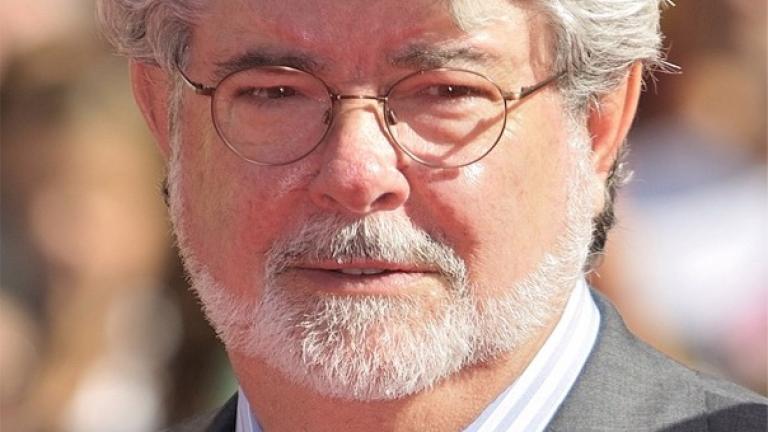Tony Award-winning actor Ian McDiarmid is starring at the Chicago Shakespeare Theater. We talk to him about the obscure play, Timon of Athens, and his famed villainy as Emperor Palpatine in the Star Wars film saga on Chicago Tonight at 7:00 pm.
Read a synopsis of Timon of Athens:
Timon is the toast of Athens. His pocketbook is open to all and the admiring hordes sing his praises and lavishly share his wealth. Alcibiades, the great defender of Athens, is among those who feast on Timon's bounty. Timon's gifts seem endless and, as his followers gather at this banquet table, their benefactor toasts to the power and reciprocity of friendship. But Timon's money is not his own and creditors come calling. Ignoring the warnings of his loyal steward Flavius and assured he can rely on the support of friends, Timon asks for help all over Athens. He receives excuses in return. Even as they enjoy his gifts, his former friends abandon him. Crazed by their betrayal, Timon throws a final banquet of stones and warm water to his stunned guests.
Alcibiades, too, is surprised by ingratitude. Despite his service to the city, the senators banish him from Athens for daring to intervene in the trial of a friend. Alcibiades vows to round up his former army and ransack the city.
Vowing to shun all society, Timon seeks refuge in the woods beyond Athens' walls and denounces all humankind. Hungry, he digs in the earth for nourishment but finds only gold. Word spreads of Timon's newfound wealth and friends predictably return, seeking him out in his cave. Raging in his misanthropy, Timon tells all of Athens to go hang, but it is himself he hangs, committing suicide and leaving behind only his epitaphs as Alcibiades negotiates with the senators and enters the city in peace.
Chicago Tonight spoke with Barbara Gaines, director of the play. Read our Q&A below.
Timon of Athens is a rarely done play and considered to be “not the finest” Shakespeare play. Why did you decide to do it?
They are all worth doing. Even Shakespeare’s lesser known plays are a billion miles away for me than any other playwright. Even the bad plays have greatness within them. Ian and I had been talking about working together for a while. And he said he would love to play Timon.
I thought it had relevance today since Timon has major financial crisis in his life. He is the richest man in Athens and loses everything. With our financial crisis we are having now, so many people have lost so much, and I thought it was an interesting parallel. I set the play in 2012 in the world of hedge funds and finance.
Do you think it was Shakespeare’s work solely? Or a collaboration as some have speculated?
It’s definitely a collaboration. It’s very easy to tell where Shakespeare’s language stops and Middleton’s begins. I think Shakespeare probably wrote about 1/3 or 2/3 of it. But they definitely collaborated, and Ian and I worked on the script for a year and a half. We tightened it and took away plot lines that didn’t go anywhere. It’s the shortest play I’ve ever done: less than an hour. We streamlined the plot.
Does it leave loose ends and how do you work with that?
There are no loose ends in our production. For example, in a scene in the first act, one of the characters is pleading for the life of a soldier in front of a judge. The soldier was a hothead who killed someone in a fight and the judge sentenced the soldier to death. But you have no idea why the other character is begging the judge to spare the soldier’s life. It’s confusing. So I added the soldier into the scene; he was missing from the original play. He’s a young soldier with flaming red hair. You see him in handcuffs. You realize what their relationship has been. So the pleading of the character makes sense because I filled in the blanks.
I took the initiative to make it clear. Theater is an interpretive art. If the playwright had been in the room with me, I would say, “you have to write another scene.” But since Shakespeare’s been dead for 400 years, I said I’m going to do it. He would’ve collaborated and written with us. Shakespeare was the man of the theater, which means he loved to collaborate with his artists. So we just collaborated long distance.
How did Ian end up playing Timon? Did you have a vision for it? What was is it like working with Ian?
Ian and I have known each other 15 years. We were friends and wanted to work together. I was working at Almeida Theatre in London, and he was an artistic director there, and we got to know each other then. When I met him, I hadn’t even seen the Star Wars films. We wanted to work together for some time.
 Can you explain the main theme of the play?
Can you explain the main theme of the play?
The thing that Shakespeare gets to in this play is that Timon does not have the tools to explore inside of him, what makes him tick. He never takes responsibility for his own actions and he is terrified of looking deep within himself. It takes a lot of courage for any of us to look inside ourselves and question our motives, and question why we did something. It’s much easier to blame somebody than to hold yourself accountable. None of us are perfect in that respect. It’s painful looking inside of yourself to explore what made you do something or not do something.
Timon has built a wall around his heart and terrible things happen because of that. On the other hand, it’s a fabulously entertaining play! It’s full of surprises and amazing language. Audiences have been absolutely loving it. Everybody is shocked that they're having such a great time at a play they never knew.
The Chicago Shakespeare Theater is in its 25th season. You’ve made Shakespeare your life’s work. Do you have a favorite play that you’ve directed?
I don’t have a favorite. The play I’m working on at the time becomes my favorite. It’s kind of like asking a parent to ask which child they love more. It’s not fair. I love them all. The thing is, I’m a student. I see myself in this world as I’m here to learn a lot. I have a lot to learn and Shakespeare is a great teacher for me. Learning to understand yourself and why people do what they do with their lives. I learn a lot from Shakespeare about that.
And the greatest thing about working in Chicago has been spending my life with so many of the great Chicago actors. They’ve been great teachers for me. And they inspire me to do my work.
Do you have any other upcoming Shakespeare projects that you’d like to discuss?
I’m doing a very modern adaptation of Moliere’s The Misanthrope called The School for Lies that I’m directing. It opens in late Fall. And Chicago Shakespeare Theater’s first production of Henry VIII opens in Spring 2013.
Gaines addresses the company at the first rehearsal for Timon of Athens in the following video.
Gaines and McDiarmid chat about adapting the play, the rehearsal process and exploring the idea of failure during an event at Chicago Shakespeare Theater. Watch the videos below for excerpts from their discussion.
Timon of Athens runs through June 10. Visit the link below to purchase tickets and view the photo gallery.

















